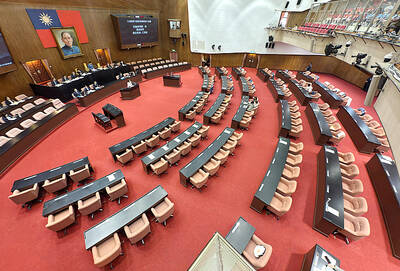The US Defense Department said on Thursday that it would supply Taiwan with key elements of a missile and air defense capability, a move aimed at defusing the threat from China.
Raytheon Co won a US Air Force contract worth up to US$752 million to supply the Early Warning Surveillance Radar by September 2009, the Pentagon said.
The system will let Taiwan's air force detect and track long- and short-range ballistic missiles, cruise missiles, enemy aircraft and surface ships with "no doubt" reliability, said Raytheon, based in Waltham, Massachusetts.
The system includes an ultra-high frequency "phased array" radar that will be integrated with Taiwanese-supplied beacons that identify aircraft as friends or foes as well as two missile warning centers, a Defense Department contract announcement said.
Raytheon began exploratory talks with Taiwan on the project in 1996, said Dan Martin, vice president, Surveillance and Sensor Systems, Integrated Defense Systems, Raytheon's "joint battlespace integration" company.
Such a system represents an important step toward identifying any inbound threats, said James Mulvenon of the Center for Research and Analysis, a Washington group that consults for US intelligence agencies.
Eventually, it could be mated with Patriot Advanced Capability 3 anti-missile batteries the US has also offered to sell Taiwan.
"The surveillance radar is the first step in the chain of engagement," Martin said. "We're proud to be selected ... to provide Taiwan with an early warning capability that will be a key element of its integrated air and missile defense system."
Mulvenon said Beijing would be particularly upset because missiles were at the forefront of its strategy for coercing Taiwan.
"This raises the possibility that Taiwan will actually be able to defend itself against those missiles," Mulvenon said.

CROSS-STRAIT COLLABORATION: The new KMT chairwoman expressed interest in meeting the Chinese president from the start, but she’ll have to pay to get in Beijing allegedly agreed to let Chinese Nationalist Party (KMT) Chairwoman Cheng Li-wun (鄭麗文) meet with Chinese President Xi Jinping (習近平) around the Lunar New Year holiday next year on three conditions, including that the KMT block Taiwan’s arms purchases, a source said yesterday. Cheng has expressed interest in meeting Xi since she won the KMT’s chairmanship election in October. A source, speaking on condition of anonymity, said a consensus on a meeting was allegedly reached after two KMT vice chairmen visited China’s Taiwan Affairs Office Director Song Tao (宋濤) in China last month. Beijing allegedly gave the KMT three conditions it had to

STAYING ALERT: China this week deployed its largest maritime show of force to date in the region, prompting concern in Taipei and Tokyo, which Beijing has brushed off Deterring conflict over Taiwan is a priority, the White House said in its National Security Strategy published yesterday, which also called on Japan and South Korea to increase their defense spending to help protect the first island chain. Taiwan is strategically positioned between Northeast and Southeast Asia, and provides direct access to the second island chain, with one-third of global shipping passing through the South China Sea, the report said. Given the implications for the US economy, along with Taiwan’s dominance in semiconductors, “deterring a conflict over Taiwan, ideally by preserving military overmatch, is a priority,” it said. However, the strategy also reiterated

‘BALANCE OF POWER’: Hegseth said that the US did not want to ‘strangle’ China, but to ensure that none of Washington’s allies would be vulnerable to military aggression Washington has no intention of changing the “status quo” in the Taiwan Strait, US Secretary of Defense Pete Hegseth said on Saturday, adding that one of the US military’s main priorities is to deter China “through strength, not through confrontation.” Speaking at the annual Reagan National Defense Forum in Simi Valley, California, Hegseth outlined the US Department of Defense’s priorities under US President Donald Trump. “First, defending the US homeland and our hemisphere. Second, deterring China through strength, not confrontation. Third, increased burden sharing for us, allies and partners. And fourth, supercharging the US defense industrial base,” he said. US-China relations under

The Chinese Nationalist Party (KMT) caucus yesterday decided to shelve proposed legislation that would give elected officials full control over their stipends, saying it would wait for a consensus to be reached before acting. KMT Legislator Chen Yu-jen (陳玉珍) last week proposed amendments to the Organic Act of the Legislative Yuan (立法院組織法) and the Regulations on Allowances for Elected Representatives and Subsidies for Village Chiefs (地方民意代表費用支給及村里長事務補助費補助條例), which would give legislators and councilors the freedom to use their allowances without providing invoices for reimbursement. The proposal immediately drew criticism, amid reports that several legislators face possible charges of embezzling fees intended to pay